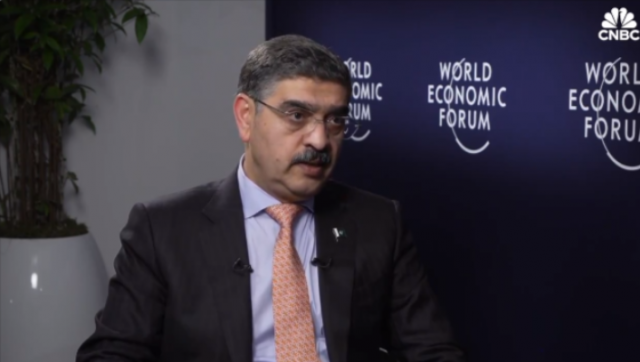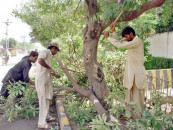Kakar says only courts to decide Imran’s fate
PM says PTI founder in jail for inciting riots; expresses optimism about stability after election

Caretaker Prime Minister Anwaarul Haq Kakar said on Wednesday that Pakistan Tehreek-e-Insaf (PTI) founder Imran Khan was not in prison on account of his political views but because of his purported role in inciting riots and encouraging his followers towards disruption.
In an interview with CNBC on the sidelines of the World Economic Forum (WEF) in Davos, Switzerland, Kakar expressed confidence that a stable government would be formed after the forthcoming general election on February 8, which eventually would lead the country to sustainable economic stability.
Referring to the violence on May 9 last year, the prime minister stated that the people, who had been involved in riots were behind bars. “It is not that the innocent people have been picked up for their political opinions and they have been denied a political role,” he said.
Responding to a question, he added that the PTI founder had the right to say that he was jailed because of his political opinion but let the court decide the issue. “The matter will not be decided by any individual, media or any other group but the courts would address these points,” he made it clear.
The prime minister emphasised that speculations regarding the elections had been addressed and everyone was certain about the voting as per the schedule. He told the interviewer that there were legal and technical challenges related to the electoral processes but those had been addressed now.
The prime minister also said that no one could question the fairness of the process, before the election taking place. “Let the election happen. There will be international observers, the international media and other watchdogs to report whether the elections were held in the free and fair manner or not.”
Highlighting the priorities of the caretaker setup, Kakar said the top priority of his government was economic revival and growth. He said the next government had to follow a clear principle of “spending less and earning more” to achieve economic stability.
“I do see, and project that there will be great growth in Pakistan. There will be a sense of stability. The growth will be slow but it will be sustainable,” he said. “We need to bring back the undocumented economy into the documented economy and transform our state to a more viable economic entity.”
He also highlighted the caretaker government’s major initiatives. “We did introduce and revamp the programme within taxation system, we brought structural changes that would be passed through the Cabinet formally by the end of the month, after that it would be in place as policy,” he said.
Caretaker Prime Minister @anwaar_kakar's special interview with @CNBC on the sidelines of the World Economic Forum pic.twitter.com/V2ACy4kHoI
— PTV News (@PTVNewsOfficial) January 17, 2024
Furthermore, he continued, the caretaker government had opted for an aggressive privatisation, cut its expenditures and was carrying out talks with the provinces to rationalise their expenditures. He said that the caretaker government would publish a white paper on its 4-5 months performance.
When asked about the media freedom in Pakistan, he replied: “I think so even freer than the Western media. If you do the comparison, the Western media is probably under more stricter regulations than the media in Pakistan.”
Talking about the increase in terrorist attacks in the country and the overall regional issues, Kakar said that Pakistan did foresee that there would be implications for the country after the withdrawal of the US forces from Afghanistan, therefore it was calling for a responsible drawdown.
Read Elections will ‘definitely’ be held on Feb 8
“The focus of the world powers is no more Afghanistan. As of now, it is an abandoned project for them. But for us it has a real-time tangible implication, particularly when the gadgets which were given to the Afghan Republic Army are being sold in the black market,” he said.
“It might also have implications in the Middle East,” the prime minister warned. He called for enhancing Pakistan’s capacity of counter-terrorism, saying that Pakistan’s role in this regard should be acknowledged and appreciated.
The interview also touched upon the deportation of illegal immigrants from Pakistan, most of whom are Afghans. Kakar stressed that there was “no perpetual ban” on the immigrants. “If they want to return to the country, they can do [so] by receiving their travel documents from back home,” he said.
“There were people for the last four to five decades and few of them no doubt were engaged with our terrorism challenge, with our crime challenge, with our organised crime challenge and other social evils, but not all of them,” he said.
Asked if US actions in Afghanistan had brought Pakistan closer to China, Kakar replied: “With China, we are strategically close. No matter what happens in the region, either in Afghanistan or anywhere else, that will not affect our relationship with China.”‘Trillion Dollar Promise’
Participating in the Trade Tech’s Trillion Dollar Promise meeting organised by the WEF, Kakar underscored the importance of ensuring equal access to technology for all nations, stressing that it would enable the impoverished nations to take advantage of the 21st century scientific advancements.
He warned that any desire for dominance overshadowed human creativity and inquisitiveness and discouraged the potential for further growth in technology. He said that the private sector should take the lead and encourage the flow of information about innovative technologies.
Speaking at another WEF event, organised by Pathfinders, Kakar reiterated Pakistan’s commitment to provide conducive environment to the private sector. Highlighting Pakistan’s big human resource, he said the country got around 1.5 million workforce in the information technology (IT) sector.
He pointed out that China was relocating some of its industry and one of the destinations would be Pakistan. “We have to be more competitive and attractive to facilitate the industrialisation journey of those in the Gulf,” he emphasised.
Separately, Kakar met his Belgian counterpart, Alexander De Croo, in Davos. Both sides reaffirmed their commitment to enhance high-level exchanges and bilateral cooperation in all areas of mutual interest including trade and investment, migration, mobility and higher education.
APP


















COMMENTS
Comments are moderated and generally will be posted if they are on-topic and not abusive.
For more information, please see our Comments FAQ